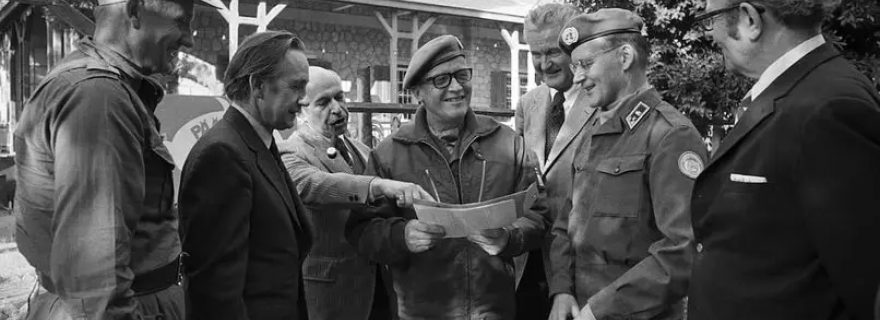In Memoriam: Sir Brian Urquhart, the UN's Architect and Builder
On 2 January 2021, Sir Brian Urquhart of the United Kingdom passed away at the age of 101. Without question, he was one of the most influential and imaginative UN staffers in the organisation's 75-year history. After serving in the British Army throughout World War II, Sir Brian joined the Preparatory Commission on the United Nations in 1945. With a strong commitment to the principles of multilateralism enshrined in the Charter, he started his 40-year career in the organisation during which he advised five Secretaries-General, designed and lead early peacekeeping operations and dealt with dozens of crises around the world. Sir Brian stands out because his work blended critical idealism, genuine commitment to neutrality and belief in multilateralism with pragmatism. In the words of Andrew Gilmour, a mentee of Sir Brian and former UN senior staffer, "he was direct, irreverent and unpretentious". While there have been many thoughtful obituaries (The New York Times& The Economist, to name a few), I want to reflect on his record in the Middle East.
In 1972, he was appointed as Under-Secretary-General for Special Political Affairs. His small office handled the work that is now split between the Department of Peace Operations and the Department of Political & Peacebuilding Affairs. While he had the entire UN's political efforts under his purview, the Israeli-Arab conflict demanded a sizeable portion of his attention and efforts.
My PhD research deals with the history of UN Peacekeeping in the Middle East in the 1970s; I seek to understand how the organisation positioned itself vis-à-vis the Israeli-Arab conflict both in terms of the political negotiations after the Yom Kippur War and on the ground through the deployment of three peacekeeping operations (plus one which was deployed in 1948). To that effect, I visited the UN Archives in New York to gather primary sources, where I discovered a couple of essential things which are worth mentioning.
Sir Brian's office was relatively small, considering all they had to manage. He was given a very complex and broad mandate and little resources to achieve them. In other words, he had to do more with less, something the UN system has been dealing with for decades. To ensure the UN's response to the Yom Kippur War was adequate, he had to take a step back and come with big picture ideas and, almost simultaneously, dig into the details.
In November 1973, it became clear that the Security Council would request the Secretariat to set up a peacekeeping operation in the Sinai Peninsula. Sir Brian's office was tasked with the design and implementation. This meant having an overarching framework in place, rallying potential troop-contributing countries, selecting candidates to the top positions, arranging the budget, and obtaining consent from the host country. Moreover, he established the principle of inter-operation collaboration. He quickly redeployed military observers from the United Nations Truce Supervision Organization (UNTSO) and the United Nations Peacekeeping Force in Cyprus (UNFICYP). By 1974, the region had three operations working simultaneously, and in 1978 a fourth was added on the border between Israel and Lebanon.
Documents from the archive reveal that he had tremendous knowledge of the operations' details; he even made recommendations about mid-level appointments, logistics and programme management. He always considered the field's perspective and gave the Force Commanders the ability to speak to him openly and honestly. True to form, he was also candid in response. He frequently requested the Force Commanders to keep in mind that their actions in the field had ramifications in New York and that peacekeeping in general was always under financial pressure. I was amazed to see how involved he was in the operation's details and how he was able to consider the field's perspective without losing sight of the big picture.
Throughout the 1970s, he set up a coordination mechanism of all four peacekeeping operations deployed in the Middle East to build a coherent political strategy and maximise pulling and sharing resources. This included creating the post of Chief Coordinator of Peacekeeping in the Middle East, who was tasked to keep an eye on the big picture. Sir Brian's contribution to the UN in the Middle East can be summarised by saying his office designed a comprehensive strategy vis-à-vis the Israeli-Arab conflict, ensured to the fullest extent possible that all personnel and assets worked in sync and that the organisation remained vital, both as an arena for dialogue and an actor through peacekeeping.
Of course, the UN's record in the Middle East is, at best, mixed, and the fact that there is still a need for peacekeeping today highlights how difficult this conflict is. But in essence, the UN never had the tools to solve the conflict and the peacekeeping operations Sir Brian designed and managed were not mandated to do so. His efforts facilitated the peace treaty between Israel and Egypt and ensured no other full-scale war during his tenure. He took the UN as far as it could go, given the mandate it received from the Security Council and pressure from the host countries.
As the incumbent UN Secretary-General said, Sir Brian "set the standard for the international civil service: dedicated and impartial". His career shows the importance of blending idealism and realism, big picture ideas and a sharp eye for detail. The UN was well-served by Sir Brian Urquhart, and one can only hope many senior staffers embody the principles and values he lived by.


